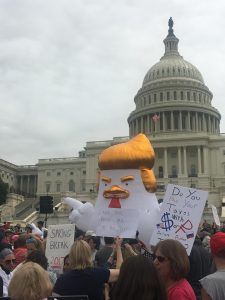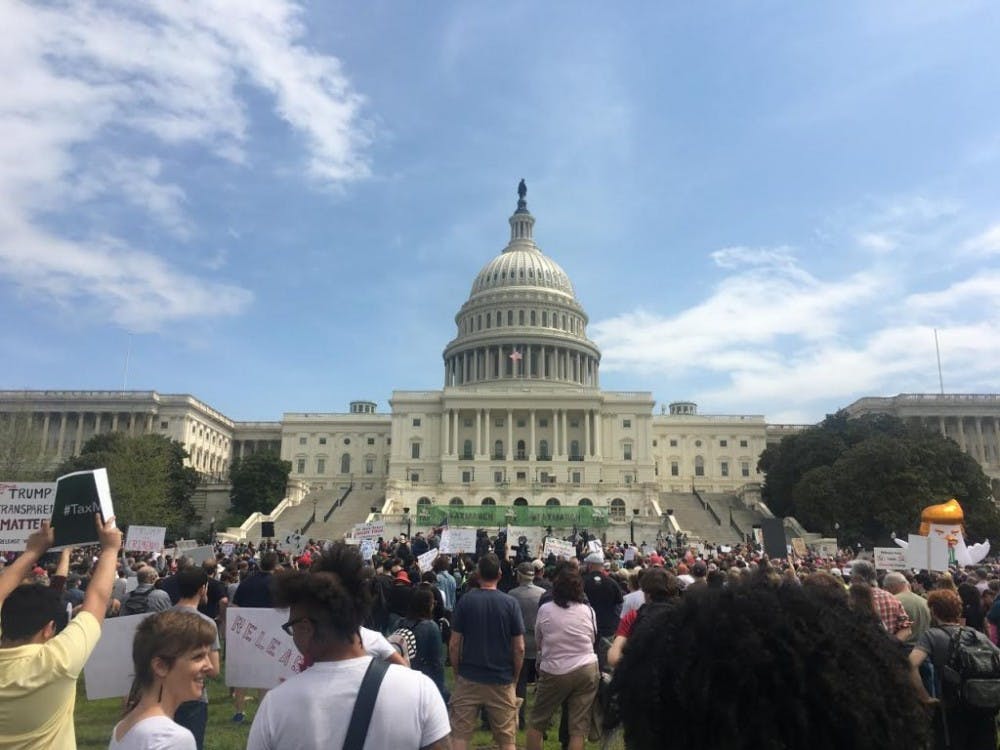Protesters gathered in Washington, D.C. to demand that President Donald Trump release his tax returns on April 15, 2017, which is traditionally Tax Day.
Members of the community, carrying signs and shouting slogans, gathered by the Inner Harbor to participate in the Baltimore chapter of the Tax March.
Jennifer Bevan-Dangel, a Hopkins graduate, helped organize the event. Bevan-Dangel is the executive director of Common Cause Maryland, a nonprofit organization which advocates for honesty and accountability in the U.S. government.
“We’re helping with these marches nationwide because we see this as part of a bigger problem — lack of transparency, lack of accountability — and it’s really the public’s right to know what’s in those tax returns,” she said.
Bevan-Dangel listed out some of her concerns regarding Trump’s ethics and transparency.
“We don’t know where the business investments are,” she said. “We haven’t seen a full divestment of the president from his companies which have investments overseas. The president has to act in the best interests of the citizens, not in the best interest of his business entanglements.”
She was optimistic about the possible effects of the Tax March.
“Marching sends a message that can’t be ignored. It makes it shown that this is something that people are willing to vote on, because they are willing to come out and spend their day being heard,” she said. “Sometimes it’s the only way to make it clear that people demand a change. We’re hopeful that this rally today will drive greater transparency on part of the administration.”
Janice Sevre-Duszynska, a member of the Association of Roman Catholic Women Priests, attended the Tax March with Max Obuszewski, a writer for the Baltimore Nonviolence Center. Both are deeply involved with activism and said that they could be found demonstrating on 33rd Street most Tuesdays.
They both decided to participate in the Tax March because they disagreed with many of President Trump’s policies and were particularly concerned with recent conflict between the U.S. and Syria.
“We’re creating an atmosphere that induces people to rise up and say ‘No’ to the U.S.,” Sevre-Duszynska said. “It’s horrendous to begin an administration with this macho, immature, bullying attitude.”
Some protesters boarded a bus to Washington, D.C., where crowds gathered in front of the Capitol and then marched along Pennsylvania Avenue. Senator Ron Wyden (D-OR), Representative Maxine Waters (D-CA) and Representative Jamie Raskin (D-MD) joined and addressed the demonstrators.
Douglas Vaughn was among the protesters who came from Baltimore to D.C.
“This is actually our first march,” he said. “I’m here to speak loudly that I definitely want to see [Trump’s] taxes.”
He thought that the Tax March could have an impact on future elections.
“Anytime the people come in a large group and show their support or their disapproval for something, it allows everybody to know where you stand,” Vaughn said. “By standing up for what you believe in, hopefully that will persuade people to vote one way or another in the elections coming up in 2018.”
Sarah Gilchrist and Jay Weixelbaum also travelled from Baltimore to D.C. to participate in the Tax March.

“We decided that we wanted to be able to do something,” Gilchrist said. “I think it’s important for you to show up and say we don’t stand for corruption in our government or our society, and this is one of the days we can do that.”
Weixelbaum explained why he joined the rally.
“It’s a reminder to be engaged, and it’s part of our democratic process,” he said.
Weixelbaum believes that one major problem with the Trump administration is its alleged ties to the Russian government.
“I think this could be one of the largest corruption scandals in American history, which is why, of course, we’re here,” he said. “The taxes would reveal many things, especially because [Trump’s] hiding them, and he’s made excuses that have fallen apart about being audited and so forth.”
Both Gilchrist and Weixelbaum agreed that activism was important in today’s political climate.
“I think people need to be more engaged,” Weixelbaum said. “What can we do? Write a letter, make a phone call, go to a rally. Staying informed. Information literacy is really important.”
Gilchrist emphasized that it was important for activists to be persistent.
“Basically, do what you can do,” she said. “I know that we all have a million things going on in our lives, but take some time to pay attention to what’s going on, and then take some action.”
They also left some advice for those interested in promoting change under the Trump administration.
“Community is the antidote to fascism,” Weixelbaum said. “Building connections between people rather than isolating ourselves is probably the most important thing you can do — finding like-minded people, standing up for the truth.”
Gilchrist suggested reaching out to those with different opinions.
“Even finding people that disagree with you, and sitting down and having a conversation,” she said. “I think we’ve forgotten how to do that in our country.”























Please note All comments are eligible for publication in The News-Letter.